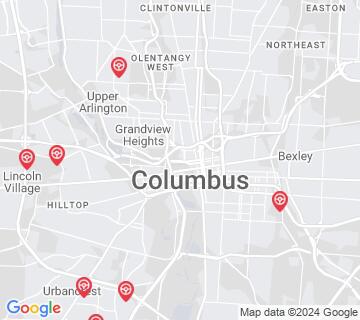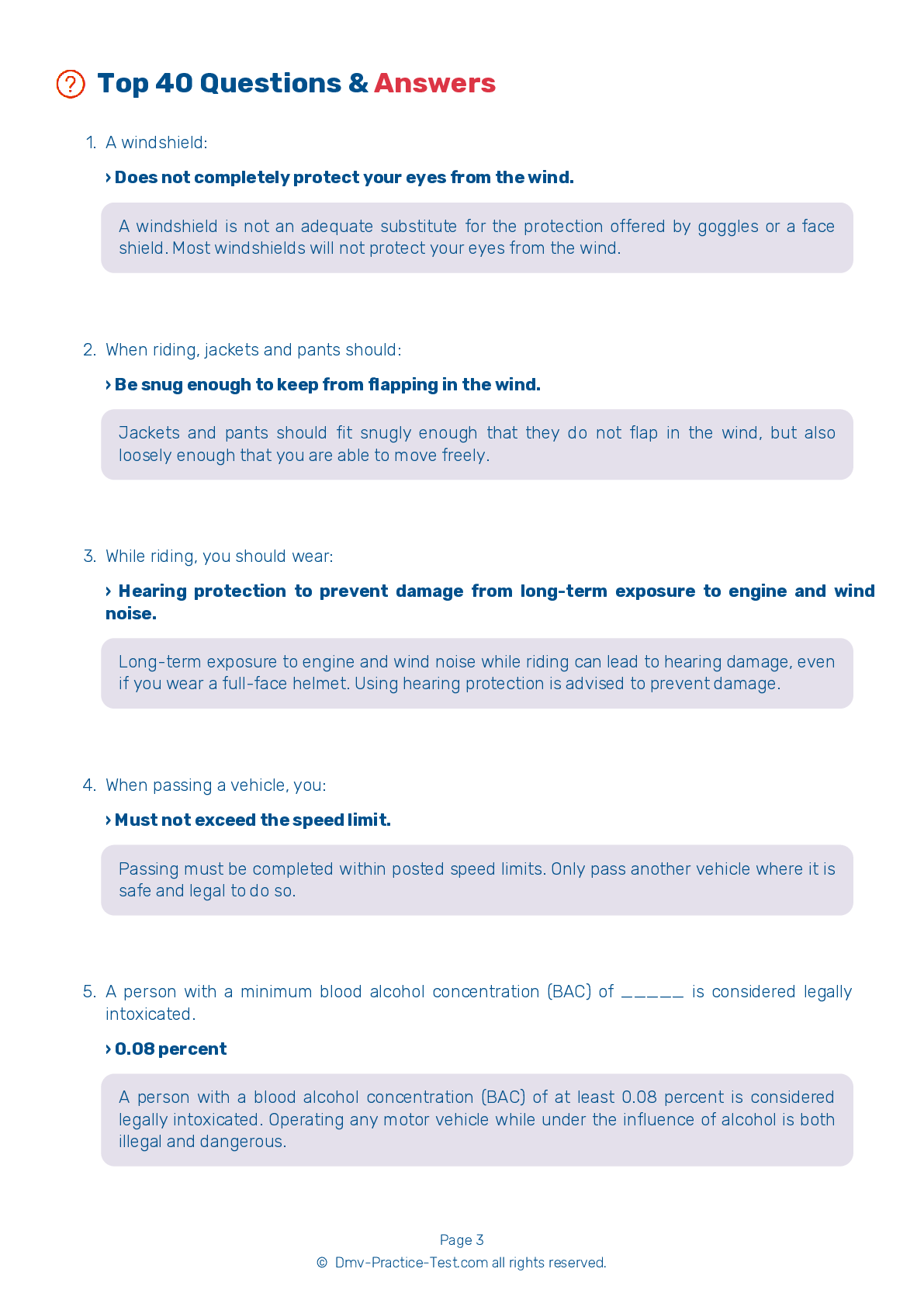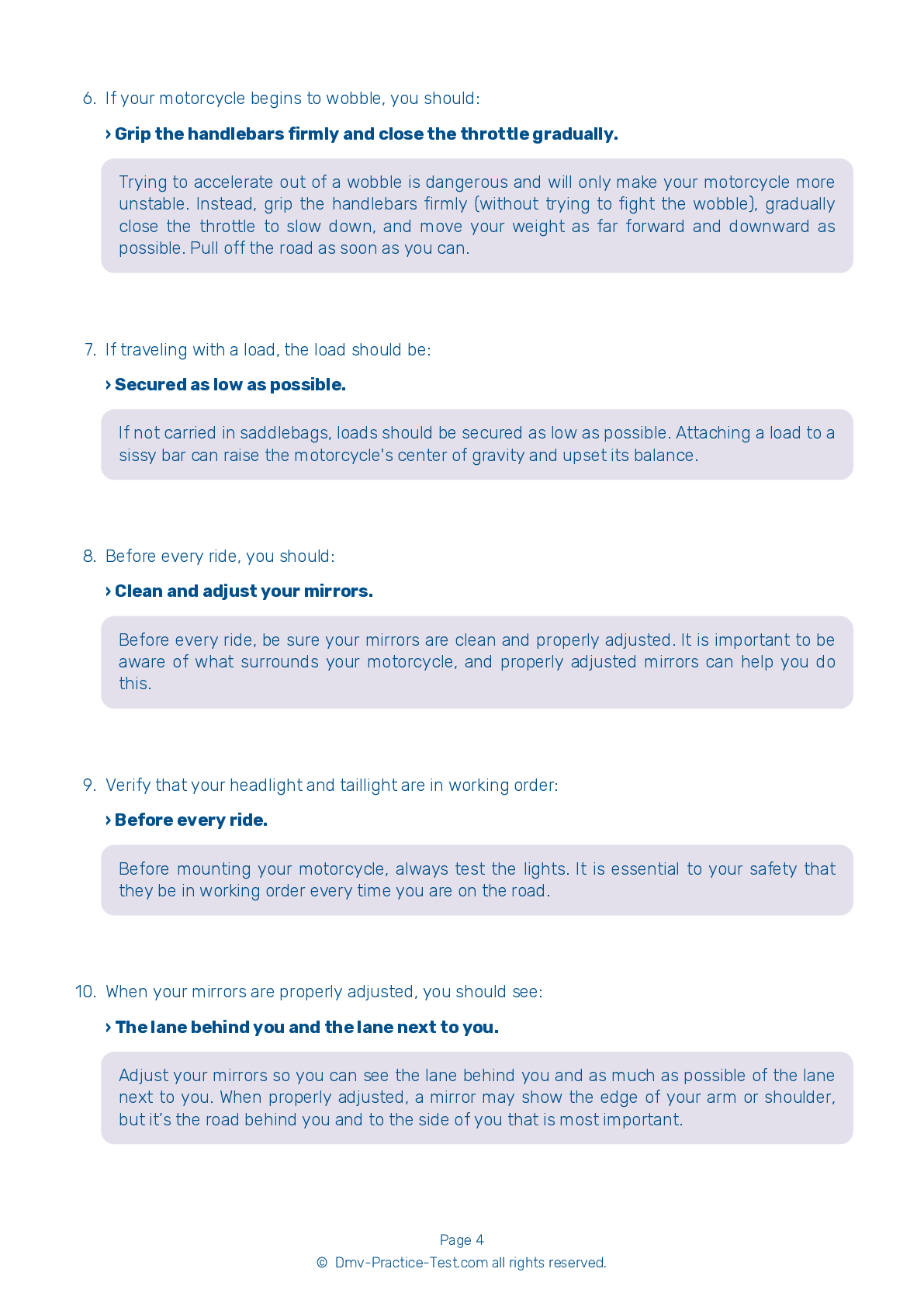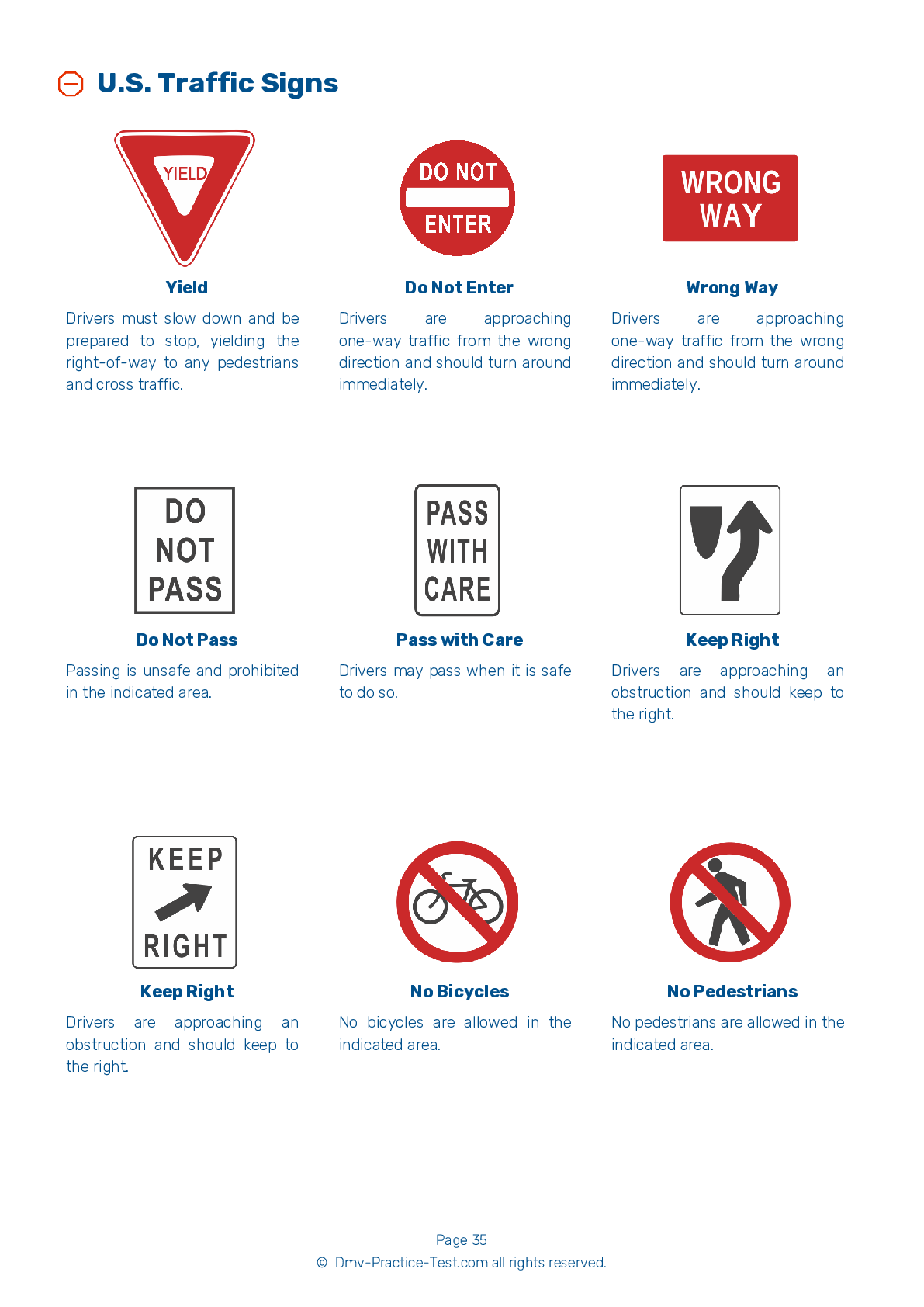DMV Permit Test #12
Motorcycle Test | License OH 2024 | FREE Online Practice! #12 Page 2 of 5
Take this FREE motorcycle test (license in OH 2024) to check your knowledge of the road rules. To improve your results, download a motorcycle handbook online, study theory, and practice for free on our website. Still worried about how to get a motorcycle license in Ohio in 2024? Check our website for more sample tests, train as much as possible, and boost your grades!
40
30
16
9 . When riding three-wheeled motorcycles in a group, you should travel in:
A single-file formation.
Lane positioning when riding in groups is an important consideration. You will not be able to use a staggered formation, as you would when riding two-wheeled motorcycles. Ride single-file and always maintain a safe margin between vehicles.
10 . What should you be most concerned about when you see this sign?
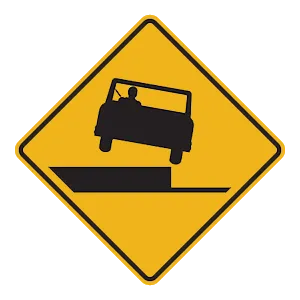
Losing control of the vehicle if you drift onto the shoulder.
This sign indicates that the shoulder is lower than the road in the area ahead. If you drift off of the roadway and one wheel drops onto a low shoulder, do not slam on the brakes or steer sharply to try to get back onto the roadway. This could easily cause you to lose control of your vehicle.
11 . Alcohol begins to affect the body:
Alcohol does not need to be digested to enter the bloodstream. It is able to reach the brain and begin to affect the drinker's body within minutes of being consumed.
12 . To help provide space for drivers attempting to merge into your lane from an entrance ramp, you should:
Ride on the far left shoulder.
Drivers merging onto a highway and into your lane may not notice your motorcycle. Give them plenty of space to safely merge by moving into a different lane, if you can.
13 . When braking on a slippery surface, you should:
Use either brake, but use only one brake.
When riding on slippery surfaces, you should use both brakes to slow down. Squeeze the brake lever gradually to avoid locking the front wheel and use gentle pressure on the rear brake.
14 . When upshifting, the first thing you should do is:
Roll off the throttle and release the clutch lever.
When upshifting, you should first roll off the throttle as you squeeze the clutch lever. Next, lift the shift lever firmly as far as it will go. Smoothly ease out the clutch and roll on the throttle as you complete the gear shift.
15 . How can you increase your ability to be seen at an intersection?
Ride closely to vehicles in front of you.
To maximize your ability to be seen at an intersection, ride with your headlight on and select a lane position that provides oncoming traffic with the best view of your motorcycle. Maintain a space cushion that allows you enough space to take evasive action if a hazard arises. You should never assume that making eye contact with a driver will be enough to make them consciously register your presence.
16 . Reflective clothing should:
Not be worn at night.
Wear reflective materials to increase your visibility, especially when riding at night. Brightly-colored clothing with reflective materials will make you more visible to other road users.
Search the best driving school in your neighbourhood
2024 Ohio | Frequently Asked Questions
To acquire a motorcycle license in Ohio, you must first obtain a motorcycle learner's permit by passing a written test. After practicing with the permit, you can take a skills test to get your license. Alternatively, you can complete a Motorcycle Ohio Rider Education Course, which includes the skills test. You must be at least 15 and a half years old to start this process.
In Ohio, the minimum age to obtain a motorcycle license (endorsement) is 16. Applicants under 18 must have a valid probationary license, complete a basic rider course, and get a parent or guardian's approval. They must also pass the motorcycle knowledge test, vision screening, and on-cycle skills test to qualify for the license.
Yes, you do need a dedicated license to ride a motorcycle in Ohio. It's called a motorcycle endorsement, which gets added to your existing driver's license. To obtain this, you need to pass a knowledge test and an on-cycle skills test. Alternatively, completion of an approved Motorcycle Safety Foundation course can waive these tests.
In Ohio, to apply for a motorcycle driver's license you need a valid Ohio driver's license, proof of your Social Security number, proof of legal presence in the U.S., and proof of your name, date of birth, and Ohio residency. For minors, a parent or guardian must also provide written consent.
Yes, you will need to take a written exam to obtain a motorcycle license in Ohio. The test covers motorcycle operation and safety rules. However, if you complete an approved Motorcycle Safety Foundation course, the written and on-cycle skills tests can be waived. But remember, a vision screening test is still mandatory for all applicants.
The written test for a motorcycle license in Ohio covers a variety of topics related to motorcycle safety and operation. These include understanding traffic signs and signals, proper riding techniques, navigating intersections, handling emergencies, and Ohio's specific motorcycle laws. The test is designed to ensure that riders have the knowledge necessary to safely operate a motorcycle on the road.
In Ohio, completion of a Motorcycle Safety Foundation (MSF) course can waive the written and on-cycle skills tests required for a motorcycle endorsement. After successfully completing the course, you'll receive a completion card which you can present at a Driver Exam Station to have the tests waived. However, you still need to pass a vision screening test.
To enroll in a Motorcycle Ohio Rider Education Course, visit the Ohio Department of Public Safety's website. You must be at least 15 and a half years old. Choose a course and location that suits you, then register and pay the fee online. The course includes both classroom instruction and hands-on training. Completion of the course includes the skills test for licensing.
No, you don't need to own a motorcycle to take the license test in Ohio. You can use any motorcycle that is insured, registered, and meets all legal safety requirements. However, it's crucial that you have permission to use the motorcycle and feel comfortable operating it for the test.
Yes, you can use a friend's motorcycle for the driver's license test in Ohio, but the motorcycle must be street-legal, registered, and insured. Also, you must have written permission from the owner if the owner is not present at the test. Remember that you are responsible for providing a safe and appropriate vehicle for your test.
Yes, during Ohio's motorcycle driving exam, specific handling skills are tested. These include starting and stopping, turning and swerving, and proper use of the clutch and throttle. You'll also be evaluated on signaling, maintaining a safe distance from other vehicles, lane positioning, and defensive driving techniques. It's crucial to demonstrate control and safety throughout the test.
Yes, in Ohio, new motorcycle drivers with a Temporary Instruction Permit Identification Card (TIPIC) face several restrictions. They are not allowed to ride at night, on interstate or limited access highways, or carry passengers. They must also always wear a helmet and protective eyewear. These limitations are lifted once they obtain a full motorcycle license.
Yes, your Ohio motorcycle license will permit you to ride a motorcycle in other states. Motorcycle licenses, like regular driver's licenses, are recognized across all 50 states due to the Full Faith and Credit Clause of the U.S. Constitution. However, you must follow the specific motorcycle laws of each state you're in.
In Ohio, only certain riders are required to wear a helmet while operating a motorcycle. Helmets are mandatory for riders under the age of 18 and for those with a "novice" designation on their license. However, it is highly recommended that all motorcyclists and their passengers wear helmets for safety reasons, regardless of age or experience level.
Yes, in Ohio, there are two types of motorcycle licenses: TIPIC (Temporary Instruction Permit Identification Card) and a full motorcycle license. The TIPIC is valid for one year and allows you to practice riding. The full motorcycle license, obtained after passing a skills test, gives you complete legal authority to operate a motorcycle on public roads.
Yes, you can add supplementary endorsements to your motorcycle license in Ohio. These endorsements allow you to operate different types of motorcycles. To add an endorsement, you must pass a written and skills test for that specific type of motorcycle. Check with the Ohio Bureau of Motor Vehicles for more details on the process.
Yes, the motorcycle license test in Ohio is available in multiple languages to accommodate non-English speakers. However, it's advisable to check with your local BMV office for the list of languages they offer for the test. They can provide you with an interpreter or translated written tests based on availability.
An effective strategy to prepare for the motorcycle license test in Ohio is to study the Ohio Motorcycle Operator's Manual thoroughly. It contains all the information you'll be tested on. You can also take practice tests available online to familiarize yourself with the format of the exam and gauge your preparedness. Remember, practical riding practice is also essential for the skills test.
Yes, the Ohio Bureau of Motor Vehicles (BMV) offers the motorcycle written exam in several languages other than English. These include Spanish, French, Arabic, and many others. It's advisable to contact your local BMV office in advance to ensure the test is available in your preferred language.
If you do not pass the motorcycle written test in Ohio, you are allowed to retake it. However, you must wait at least 24 hours before attempting the test again. It's recommended to review the Ohio Motorcycle Operator's Manual thoroughly before retaking the test to increase your chances of passing.
